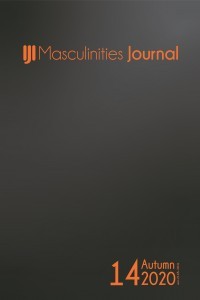Arkadaşlığın Dayanılmaz Hafifliği: Homososyallik ve "Erkeklik Krizi"
karma evlilik, hristiyan-müslüman eşler, müslüman erkeklik
The Unbearable Lightness of Friendship Homosociality and the “Crisis of Masculinity”
Mixed marriages, Christian-Muslim couples, Muslim masculinity,
___
- Allan, J. (2014), March. “Masculinity as Cruel Optimism”. Paper presented at the American Men’s Studies Association Annual Conference, Tacoma, Washington.
- Allan, J. (2015). “No Future for Boys”, Journal of Boyhood Studies 8, 1: 22-33.
- Anderson, E. (2011). Inclusive Masculinity: The Changing Nature of Masculinities. London: Routledge.
- Arxer, S. L. (2011). “Hybrid Masculine Power: Reconceptualizing the Relationship between Homosociality and Hegemonic Masculinity”, Humanity & Society, 35, 4: 390-422.
- Braedley, S. (2010). ‘“Accidental” Health Care: Masculinity and Neoliberalism at Work’. In Braedley, Susan and Luxton, Meg. Eds. Neoliberalism and Everyday Life. Montreal: McGill University Press.
- Bridges, T. (2013). ‘Issues of Intimacy, Masculinity, and Ethnography’. In Pini, Barbara and Pease, Bob. Eds. Men, Masculinities, and Methodologies. New York: Palgrave MacMillan.
- Chu, J. (2014). When Boys Become Men: Development, Relationships, and Masculinity. New York: New York University Press.
- Clare, A. (2001). On Men: Masculinity in Crisis. London: Arrow Books.
- Connell, Raewyn. 2009. ‘A Thousand Miles from Kind: Men, Masculinities and Modern Institutions’. Journal of Men’s Studies Vol 16(3): 237-252.
- Connell, R. (2010). ‘Understanding Neoliberalism’. In Braedley, Susan and Luxton, Meg. Eds. Neoliberalism and Everyday Life. Montreal: McGill University Press.
- Farr, K. A. (1988). ‘Dominance Bonding through the Good Old Boy Sociability Group’. Sex Roles Vol 18: 259-277.
- Flood, M. (2003). Men, Sex and Mateship: How homosociality shapes men’s heterosexual relations. Paper presented at (Other) Feminisms: An International Women’s and Gender Studies Conference, University of Queensland, 12-16 July. Accessed March 2015. http://www.eurowrc.org/04.material/books/xy-Michael-Flood/Flood_Men_sex_mateship.pdf.
- Flood, M. (2007). “Men’s Relations with Men”. Pp. 423-427, in International Encyclopedia of Men and Masculinities, ed. Michael Flood, Judith Kegan Gardiner, Bob Pease, and Keith Pringle. London: Routledge.
- Flood, M. (2008). Men, Sex, and Homosociality: How Bonds between Men Shape Their Sexual Relations with Women’. Men and Masculinities Vol 10 No 3.
- Flood, M. , Gardiner, J.K., Pease, B. (2007) & Pringle, Keith. Eds. Encyclopedia of Men and Masculinities. London: Routledge.
- Başlangıç: 2014
- Yayıncı: Eleştirel Erkeklik İncelemeleri İnisiyatifi
Bir Osmanlı Fetişi Olarak Modernite: Kesik Bıyık’ta Osmanlı Erkekliğinin Temsilleri
Arkadaşlığın Dayanılmaz Hafifliği: Homososyallik ve "Erkeklik Krizi"
Değişen Babalık Üzerine Literatür Taraması
The Body as Capital: Masculinities in Contemporary Latin American Fiction
Beyaz Yakalı Eşcinseller İşyerinde Cinsel Yönelim Ayrımcılığı ve Mücadele Stratejileri
Adalet Kıskacında Erkeklik: Mahkûmların Suça, Tutukluluğa ve Değişime Dair Düşünceleri
Bettina Jansen, and Wieland Schwanebeck (eds.) Männlichkeit. Ein interdisziplinäres Handbuch
